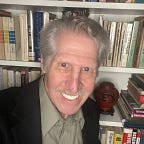A PARABLE OF LIBERTY LOST AND FOUND — Part 3 of 10: The Republic
The original settlement becomes a big town. Other towns are built as people inhabit more parts of the island.
Scaled-up farming frees islanders to do more than raise food. Industries develop to meet people’s wants and needs. Mining and smelting produce metals for tools and machines. Miners find gems and minerals that people trade for goods and services. Barter continues but decreases. Commerce replaces consciousness as the focus of daily life.
People still know about their universal oneness, but the outer trappings of spirituality matter more than inner awareness. The vestiges of honest spirituality become codified into a formal religion. The priests preach that worldly riches are proof of God’s approval.
In each town on the island, one or two families excel at building wealth. Powerful men usually control these families.
One of these men is Peter Zack. He generously helps his less-affluent neighbors. He also funds public works. Zach is famous for his family crew draining a pest-infested swamp as part of a new islandwide irrigation system.
Men do most of the physical labor and intellectual work. Women’s given role is motherhood. Mrs. Zack is praised for bearing eight children. Women also earn praise for charitable work. Women’s voices matter less than men’s voices in making decisions at island gatherings under the Unity Tree.
Widening gaps in wealth incite more crime. The council enacts more laws. The sheriffs enforcing the laws report to the elders, who serve as judges for trials by juries. The punishment for crime is imprisonment, for population growth left no uninhabited areas, so banishment is impossible. Returning offenders are shunned. Unable to earn a good livelihood, felons often fall back into crime. Few in society see the trap.
Meetings at the Unity Tree grow too big to make decisions quickly. Some people complain about the time it takes to reach consensus on increasingly complex community issues. Others gripe about the time it takes to educate oneself enough to vote intelligently. More than ever live too far away from the Unity Tree to attend every council meeting. Regional frictions cause complaints.
Eventually, for most people, direct democracy feels like too much work.
After years of grumbling, the people amend their constitution to change the nature and structure of thhei8r government.
People agree to leave the job of lawmaking to a few wise heads. The entire island from now on will elect council representatives to serve as delegate proxies for all of the islanders if they were gathered together. Elected delegates are of the people to create laws by the people and for the people. A few will look after island affairs for everyone.
Under their new social contract, the people establish a representative democracy, sometimes called a full democracy. More precisely, they establish a working republic. Abdicating from direct democracy, the people place their faith and future in the hands of those they elect to represent them. Power shifts from the people to their leaders.
The amended constitution creates a fair system of publicly funded elections. Each campaign committee for each candidate and ballot issue receives an equal amount of tax money paid by all the islanders every year. At public meetings in every town and region, the candidates and issues advocates get equal time to persuade voters. People research the candidates and issues before they vote. People vote carefully and never miss an election.
Delegates in the new congress share the same concerns as those electing them, so they vote the same way as the whole island would vote if all the people were present. The elected representatives and voters trust and respect one another. On such integrity rests the strength of any republic and the happiness of the governed.
The republican government sustains most policies of the democratic government. Changing the form of government hardly seems to impact the overall quality of life, not at first, but without Spirt guiding community choices, the trajectory of society shifts.
In this way, the people elect leaders to balance freedom and responsibility for them. If citizens elect wise leaders, so long as private money is kept out of the public elections, such a republic lasts as long as most people behave themselves.
< Previous | Next >
Excerpt from the expanded preamble for
MAKING GLOBAL SENSE
Grounded hope for the 21st century
inspired by Thomas Paine’s Common Sense.
(http://globalsense.com)
Please follow Judah Freed on Medium and like the book page on Facebook.
This is a work of fiction. Names, characters, businesses, places, events, locales, and incidents are either the products of the author’s imagination or used in a fictitious manner. Any resemblance to actual persons, living or dead, or actual events or places is entirely coincidental or is intended purely as an allegorical satire, parody or spoof of such person, event or place, and is not intended to communicate any true or factual information about that person, event or place.
